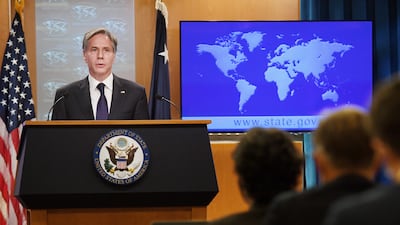A significant void in US ambassadorial posts across the world is constraining American diplomacy at a moment of sprawling crises and intensifying global power competition, say former diplomats.
Out of 186 posts, 61 positions remain vacant, according to The American Foreign Service Association.
Thirty-three of these vacancies — including in places such as Morocco, India, Australia, Yemen and Denmark — have been assigned a nominee by President Joe Biden's administration but are stalled in the Senate foreign relations committee, which is evenly split between Democrats and Republicans.
Up until February, Republican Senator Ted Cruz used a procedural measure to block dozens of State Department nominees over disagreements with the White House about the Nord Stream 2 pipeline.
Russia's invasion of Ukraine saw that project put on indefinite hold, and some of those nominations have now moved forward.
But the Senate’s busy calendar and the Biden administration's continued delay in nominating ambassadors for critical countries are undermining US diplomacy, three former US ambassadors told The National.
Crucial places including Kyiv, Abu Dhabi, Riyadh, Prague, Tallinn and Kuwait City still have no US ambassador even nominated.
“This is the slowest I have seen [this process] in my professional life,” said John Herbst, senior director of the Atlantic Council think tank's Eurasia Centre.
In addition to the Senate delay, Mr Herbst, a former US ambassador to Ukraine and Uzbekistan, pointed to logistical failings by the State Department and White House.
“It’s just simply a failure of the Biden team, the apparatus for moving nominations forward which involves a filtering process, the selection process by the State Department, and political vetting by the White House,” Mr Herbst told The National.
In the case of Eric Garcetti, mayor of Los Angeles and the administration’s nominee for ambassador to India, Axios news website this week reported that he may not have the 50 votes needed in the Senate.
Some senators have raised questions about Mr Garcetti's handling of a sexual harassment case in his office.
In other cases, such as Saudi Arabia, the UAE and Kuwait, the White House has not even submitted a nomination.
Sources familiar with the process told The National that the administration is in the final process of sharing names with those nations.
Gerald Feierstein, a former ambassador to Yemen and senior fellow at the Middle East Institute think tank, saw the delay in nominating ambassadors to Riyadh and Abu Dhabi as inexplicable.
“It is insane that we don’t have ambassadors in two of the most significant capitals in the Middle East,” he said.
“We do have very capable charges d’affaires … but given the strains in our bilateral relations at the moment, we need diplomatic representatives who can speak authoritatively about US policy and engage with senior leaders of those governments,” he added.
In the case of Ukraine, the administration has recently informed Kyiv of a potential nominee for the position, former US ambassador to Ukraine William Taylor told The National.
Under diplomatic protocols, Washington shares the name with the foreign government and awaits its consent before a public announcement.
It was “hard to understand” why it had taken the Biden team so long to proceed with the Ukraine nomination, said Mr Taylor, vice president of Russia and Europe programmes at the United States Institute of Peace federal institution that promotes global security.
They “finally asked for approval agreement from the Ukrainians — who have not given the approval yet”, he said.
“They've got other things on their mind … they are fighting a war.”
But Mr Taylor said the damage from not having an ambassador in place should not be exaggerated.
“We always have somebody in charge, and the charge d’affaires in Kyiv [Kristina Kvien] has been doing a great job,” Mr Taylor said.
But for Mr Feierstein, there is no substitute for having an ambassador. “The difference between an ambassador and a charge is that the ambassador is the personal representative of the president and confirmed by the Senate.”
An ambassador nominated by the president would speak for the whole administration, he said.
“When the ambassador reports back to Washington, they speak with an authority that a charge doesn’t have.”
The White House was not immediately available for comment.


